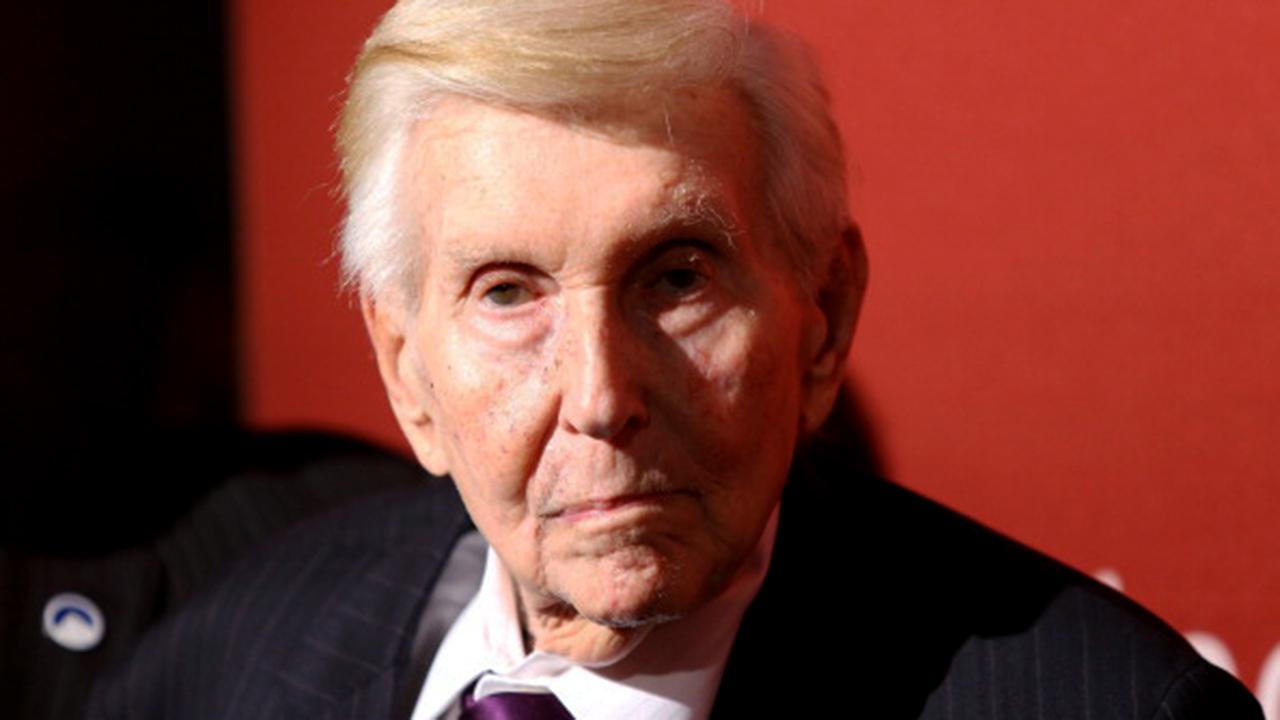Media empire builder Sumner Redstone dies at 97
Famously hot-tempered, Redstone was known to his own grandchildren as "Grumpy"
Sumner Redstone, who turned his family’s movie-theater company into a global media empire spanning television, movies, radio and books, and who famously proclaimed that “content is king,” has died.
Mr. Redstone, who died Tuesday, was 97 years old.
Rising from humble beginnings, he achieved fame in the entertainment industry late in life, assembling a sprawling set of assets through a mix of savvy investing, creative litigation and all-around ruthlessness. He was among a now-shrinking group of moguls like John Malone and Rupert Murdoch who have shaped the media landscape through gutsy mergers.
The companies he controlled, CBS Corp. and Viacom Inc., delivered an array of programming into American living rooms and onto the big screen, from CBS prime-time shows like “The Big Bang Theory” and irreverent cable programs on MTV and Comedy Central to film hits from the Paramount Pictures studio such as “Titanic” and “Top Gun.”
The mercurial Mr. Redstone was famously hot-tempered in both his business and family dealings. Known to his own grandchildren as “Grumpy,” over the years he sparred with and dismissed several top executives, feuded with nearly all of his closest family members and was so hard on wait staff that he was barred from some restaurants.
GET FOX BUSINESS ON THE GO BY CLICKING HERE
Having survived several brushes with death -- once by fire and later by cancer -- he loved to boast that he would never die. On the rare occasion that he would admit to being mortal, he assured investors in his $27 billion media empire that his meticulous estate planning would ensure that he would control his assets from beyond the grave.
But as his health began to falter in his later years, a series of battles unfolded over who would control his empire. A question at the center of those fights was whether he had the mental capacity to continue as the controlling shareholder.
Stocks In This Article:
When the dust settled by the fall of 2018, his once-estranged daughter, Shari Redstone, was calling the shots at both CBS and Viacom, as the de facto leader of National Amusements Inc., the family holding company that owns 80% of the voting shares in each company. The two former chief executives with whom she had sparred, Viacom’s Philippe Dauman and CBS’s Leslie Moonves, had been forced out. On her watch, CBS and Viacom agreed to merge in 2019.
VIACOM-CBS DEAL NEARS FINISH LINE
Mr. Redstone’s controlling interests in the media companies will now be managed by a seven-person trust on behalf of his grandchildren and their descendants. Ms. Redstone is on the trust, along with her son Tyler Korff, and several other Redstone family associates.
Mr. Redstone grew up in Boston’s West End, a lower-income immigrant enclave. His family’s apartment had no toilet; they used a pull-chain commode down the hall. His father had dropped out of high school to drive trucks for his own father’s bakery-supply business, a resource that family members say he put to more lucrative use during Prohibition.
After repeal, he went into liquor wholesaling and, in partnership with a local bookie, opened one of the country’s first drive-in theaters. The partners also went into the nightclub business.
EMPLOYEES TO GRILL VIACOM, CBS EXECS ON MERGER 'SYNERGIES'
His father changed the family name from Rothstein to Redstone when Sumner was in high school, a change that dismayed him. “I thought my father was trying to walk away from our being Jewish,” he wrote in his 2001 autobiography, “A Passion to Win.” But others close to the family said it was Sumner, a talented student who envisioned a future far removed from any wrongful association with the famous gangster Arnold Rothstein, who wanted the name change.
As a student at Harvard University, Mr. Redstone participated in a special intelligence group that worked to break Japanese military and diplomatic codes during World War II. He attended Harvard Law School and, upon graduation, went to work in the government. He was a special assistant to the attorney general when the Justice Department was pursuing U.S. v. Paramount, an antitrust case that broke up the traditional Hollywood studio system.
In 1954, he joined the family’s drive-in theater company, later renamed National Amusements, and over time took control, aggressively expanding around the East Coast and Midwest. Drawing on his Justice Department experience, he successfully sued the major studios in 1958 to force them to give his theaters top movies at the same time they were made available to bigger theater chains.

He pioneered the development of theaters with more than one screen and even trademarked the term “multiplex” for the concept, now commonplace.
In 1979, at age 55, Mr. Redstone’s brilliant career was nearly cut short. He was staying at Boston’s Copley Plaza hotel when he awoke to the smell of smoke. He opened his hotel room door and was engulfed in flames, he recounted in “A Passion to Win.”
“The fire shot up my legs. The pain was searing. I was being burned alive,” he wrote. What he didn’t mention in his autobiography is that he was in the room with his longtime mistress, Delsa Winer, who managed to escape out the window with minor injuries. The fire left him with burns over 45% of his body and a gnarled claw for a hand.
In 1987, after a series of well-timed investments in Hollywood studios, Mr. Redstone made his biggest business move yet: going after Viacom. The company had been spun out of CBS in 1971 to comply with new rules (repealed in the 1990s) against vertical integration.
Viacom owned cable systems, TV and radio stations, as well as cable channels MTV and Showtime. The management of Viacom was trying to take it private. Mr. Redstone countered with a higher bid and ultimately secured the deal for $3.4 billion.
One of Mr. Redstone’s lifelong dreams was to own the Paramount film studio, and he ramped up his pursuit of the company in the early 1990s. It turned out to be one of the defining struggles of his career. After years of courting Paramount CEO Martin Davis, Mr. Redstone finally negotiated an $8.2 billion deal to buy the company in 1993.
TYLER PERRY REVEALS HOW HIS COMPANY IS OPERATING IN 'CAMP QUARANTINE'
But before long, a rival emerged when Barry Diller, head of the QVC shopping network and a former Paramount executive, launched his own bid. What followed was a fierce and very public bidding war that Mr. Redstone said strained his relationship with Mr. Diller. “This was a betrayal of the highest order,” Mr. Redstone wrote in his autobiography. “I’ve been his friend, and now he’s coming after our deal.”
Both sides raced to line up sources of cash. Mr. Diller’s backers included Liberty Media Corp.’s John Malone and Comcast Corp.’s Brian Roberts. Mr. Redstone tapped Blockbuster Entertainment and the phone company NYNEX. To seal the deal, Mr. Redstone engineered a risky merger with Blockbuster that gave him access to cash flows to support a higher bid. He ultimately won Paramount for nearly $10 billion.
At the time, critics on Wall Street thought Mr. Redstone overpaid for a studio that had suffered a string of movie flops, but he was confident. “Today is only the beginning of the creation of this vast new enterprise,” he said. Paramount went on to release blockbusters like “Titanic” and the “Mission: Impossible” franchise.

Actress Kate Winslet and actor Leonardi DiCaprio in a scene from "Titanic," a blockbuster from Paramount Pictures under Sumner Redstone's leadership. (Publicity photo)
Mr. Redstone added CBS to his holdings in 1999 through a $37 billion stock merger, the largest media deal up to that point in U.S. history. Mr. Redstone saw the company’s broadcast TV and radio operations as natural complements to Viacom’s cable portfolio. Within a few years, though, his outlook began to change, as cable growth accelerated and broadcast looked like a relative laggard.
In 2006, frustrated with Viacom’s stagnant stock price, Mr. Redstone divided CBS and Viacom once again. He put Mr. Moonves in charge of CBS; MTV pioneer Tom Freston was installed as Viacom’s chief executive, but he didn’t last a year on the job.
DISNEY ASKING FOR MORE MONEY TO STREAM 'MULAN' ISN'T AS OUTRAGEOUS AS IT SOUNDS
In a move that shocked Wall Street, Mr. Redstone pushed Mr. Freston out following a drop in Viacom’s stock price and reports that Viacom was slow to pursue opportunities such as an acquisition of social network Myspace, which went instead to rival News Corp. (Myspace later faltered and News Corp. sold it for a fraction of the $580 million purchase price.)
“I have one goal: to do what is best for Viacom,” Mr. Redstone told The Wall Street Journal at the time.
Mr. Redstone also had plenty of turbulence in his personal life. His marriage to his first wife, Phyllis, ended in 1999 after more than 50 years. Four years later, he married a former schoolteacher, Paula Fortunato, who was 39 years his junior. The couple moved to Los Angeles, from Mr. Redstone’s longtime East Coast base, taking residence in a Beverly Hills mansion next door to Sylvester Stallone. They divorced in 2008.
In February 2006, his son Brent filed suit against National Amusements, seeking the company’s dissolution to gain control of his one-sixth stake. The suit alleged his father led a campaign to “freeze out” his son from the company’s business operations. National Amusements said the allegations were unfounded. The suit was settled a year later, with Brent being bought out.
Mr. Redstone once touted his younger child, Shari, as a rising star and likely successor. But the two went through periods of intense friction, at one point only communicating by fax. In November 2014, he offered her a deal worth $1 billion for her 20% stake in National Amusements, contingent on her relinquishing her bid to be chairman of Viacom and CBS after his death, the Journal reported at the time. She refused.
Drama over Mr. Redstone’s condition began to intensify in the fall of 2015. When the mogul kicked former companion Manuela Herzer out of his Beverly Park, Calif., mansion, and removed her as his health-care agent, she sued to challenge his mental competency.
The suit was eventually dismissed, but not before the case became a major spectacle in the media world. In a videotaped deposition, Mr. Redstone had great difficulty communicating, was unable to answer basic questions about himself or spell out words, according to a transcript.
In February 2016, Mr. Redstone stepped down as chairman of his two companies, and the boards elevated the respective chief executives—Mr. Moonves at CBS and Mr. Dauman at Viacom—to replace him in those posts.
But Mr. Redstone remained controlling shareholder and began to make sweeping changes. In May, following the resolution of the Herzer lawsuit, Mr. Redstone removed Mr. Dauman from the National Amusements board and his trust. He later replaced five Viacom board members. The removed parties sued, seeking to be reinstated and alleging that their dismissals were orchestrated by Ms. Redstone.
Ms. Redstone, a 65-year-old lawyer who also runs an early-stage investment outfit called Advancit Capital, denied those charges.
CBS LAWSUIT CAN CONTINUE ON LES MOONVES COMMENTS
The lawsuits were dropped in a settlement that included Mr. Dauman’s exit and left Ms. Redstone more powerful than ever.
Her first order of business was to urge CBS and Viacom to explore a merger in the fall of 2016. Many analysts had long thought that the decision to split them had been a mistake and that the pairing of Viacom’s cable channels with a must-have broadcast network like CBS was a better way to wring more money out of pay-TV distributors.
But now that cord-cutting was hurting Viacom’s cable channels more than CBS’s broadcast network, CBS’s then-CEO, Mr. Moonves, was cool to the prospect, and National Amusements soon called off the wedding.
The main thing is to have a good life. You have to love your work.
A year later, with the media industry continuing to consolidate, Ms. Redstone again pushed CBS and Viacom to mull a merger but again ran into resistance. CBS unleashed a surprise attack, suing in May 2018 to not just block the merger, but to remove her family’s voting control permanently. National Amusements fought back, and the matter looked headed for trial.
Meanwhile, a storm was gathering over CBS. The New Yorker in July reported allegations by more than a dozen women that Mr. Moonves had sexually harassed and assaulted them. Mr. Moonves has denied the allegations.
CBS NIXES $120M SEVERANCE FOR LES MOONVES
The first of the stories wasn’t enough to dislodge him, but shortly after the second one was published, he resigned amid a broader settlement between CBS and National Amusements that resolved the pending litigation and further increased Ms. Redstone’s power. In December 2018, following an investigation into Mr. Moonves’s alleged misconduct, the CBS board fired Mr. Moonves for cause, depriving him of $120 million in potential severance.
CBS and Viacom agreed to merge in 2019, undoing the split Mr. Redstone had carried out 13 years earlier. National Amusements gave unanimous approval to the deal, with Mr. Redstone among the directors voting in favor.
Mr. Redstone, a health nut who shunned sugar and swore by antioxidants, told the Journal in 2012 that he was working on a new book -- later shelved -- called “How to Live Forever,” in which he planned to share his secrets to good health.
As he told the Journal: “The main thing is that to have a good life, you have to love your work.”




















